
Chancellor Nicholas S. Zeppos presented seven faculty research awards, including two new awards for efforts that advance understanding of diversity, at the Fall Faculty Assembly on Aug. 25.
The newly established Chancellor’s Research Awards for Equity, Diversity and Inclusion recognize excellence in research, scholarship or creative expression that advances understanding of equity, diversity and inclusion. Three faculty members were honored with the two new awards.
Each of these awards carries a stipend of $1,000, and the recipient receives an engraved pewter julep cup.
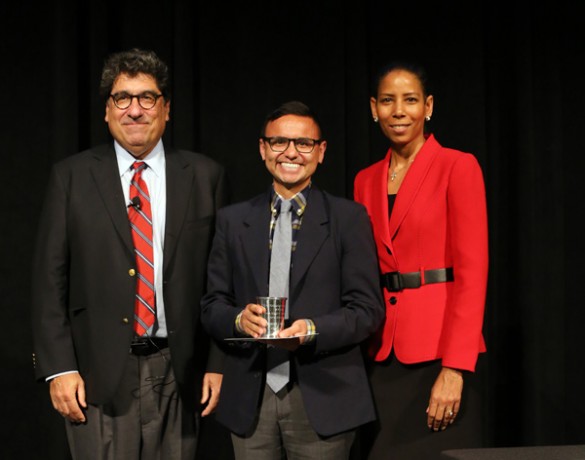
One of the awards went to Gilbert Gonzalez, assistant professor of health policy, for his research documenting that LGBT couples and their children were less likely to have private health care insurance due to historic barriers associated with adding same-sex partners to employer-sponsored plans. Using data from large federal surveys and quantitative research methods, he conducted numerous studies on health and access to care for LGBT families and same-sex couples.
His publication in JAMA Internal Medicine documented disparities in physical and mental health outcomes between lesbian, gay and bisexual adults and their heterosexual peers. He and his co-authors found high levels of distress in these groups, including heavy alcohol and tobacco use, compared to their heterosexual peers. Gonzalez and his co-authors hypothesized that discriminatory environments and public policies stigmatize LGBT people and engender feelings of rejection and low self-esteem, which in turn can shape their health and health-related behaviors.
“His work sheds a much-needed light on the chronic stress associated with being a member of a marginalized minority population,” Zeppos said. “I applaud the potential his work holds for bettering our society.”
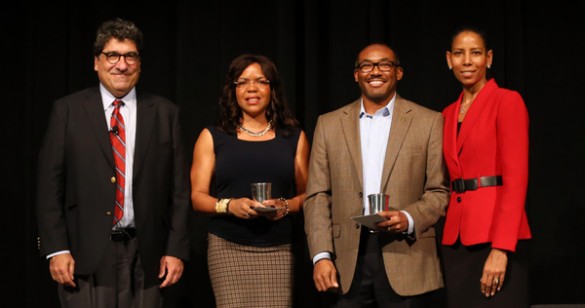
The second diversity award went to a team of researchers: Ebony McGee, assistant professor of diversity and STEM education for Peabody College, and William H. Robinson, associate professor of electrical engineering and associate dean in the School of Engineering.
McGee’s and Robinson’s work to broaden minorities’ participation in engineering has significantly informed the understanding of factors that often discourage black scholars from pursuing academic careers. Their leadership of the Explorations in Diversity Engineering Faculty Initiative (EDEFI) combined with their investigation of the institutional, technical, social and cultural circumstances that influence decision-making and career choices for black engineering doctoral students illuminate the current dynamics that contribute to the under-representation of black people in engineering faculty positions.
“Over the past three years McGee and Robinson have served as co-principal investigators on several projects as part of EDEFI, providing an inspiring model of collaboration between engineering education and social science,” Zeppos said. “Their exemplary efforts have engaged the Vanderbilt community, and a national audience, on the topics of equity, diversity and inclusion in science, technology, engineering and mathematics.”
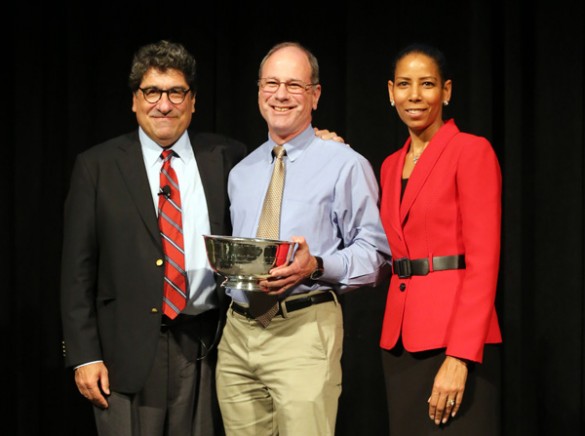
At the assembly, Zeppos also conferred Vanderbilt’s top research award, the Earl Sutherland Prize for Achievement in Research, on David Kosson, a revered teacher, scholar and scientist whose discoveries have provided an environmental compass for national agencies. The Sutherland award is presented annually for faculty accomplishments in research, scholarship or creative expression.
Kosson, Cornelius Vanderbilt Professor of Engineering, professor of civil and environmental engineering, professor of chemical engineering, and professor of earth and environmental sciences, has conducted significant research on how materials in the built environment release contaminants that can affect the natural environment. He has translated his discoveries to help create scientifically grounded regulatory policies for agencies like the EPA, the U.S. Department of Energy, and several international groups.
“David’s seminal work is safeguarding human health and significantly impacting public policy in our backyard and around the world,” Zeppos said. “His research has led to the formation of the Leaching Environmental Assessment Framework — known as LEAF — which is responsible for directly influencing several important U.S. environmental regulatory decisions and policies.”
Kosson received $5,000 and an engraved pewter julep cup. His name has also been added to a silver bowl that lists all the recipients, which Kosson will keep for a year.
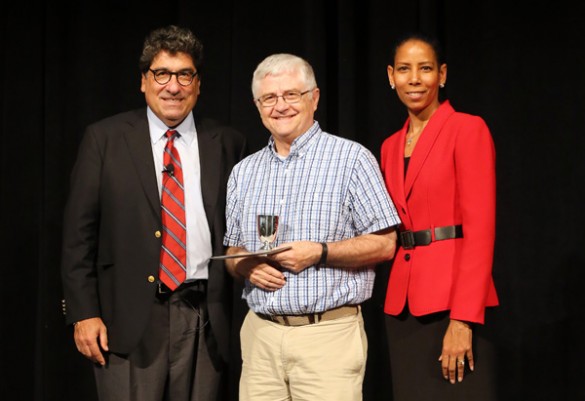
Zeppos presented the Thomas Jefferson Award to Malcolm Getz, professor of economics and director of undergraduate studies. This annual award recognizes distinguished service to Vanderbilt through extraordinary contributions as a member of the faculty in the councils and in the governance of the university. “From serving as the director of Central Library to associate provost for information services, Getz’s steady and visionary leadership has propelled Vanderbilt forward,” Zeppos said.
Getz, an expert in urban economics and public finance, has been a pioneer at Vanderbilt, advancing technology on multiple levels to modernize and improve several university information services. His projects include the Acorn online catalog, campus data and video networks, the digital telephone system and Vanderbilt’s first electronic classroom. He also served on the Ad Hoc Committee on Microcomputers, which led to the creation of the microcomputer lab.
Getz was awarded an engraved pewter goblet and a $2,500 prize.
Zeppos also presented five Chancellor’s Awards for Research. These prizes recognize excellence in research, scholarship or creative expression for works presented or published in the preceding three calendar years. Each of these awards carries a stipend of $1,000, and the recipient receives an engraved pewter julep cup.
Chancellor’s Awards for Research
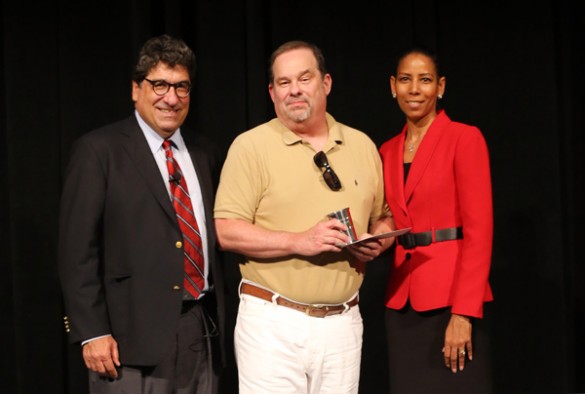
Christopher Johns, the Norman and Roselea Goldberg Professor of History of Art
Johns was recognized for his book The Visual Culture of the Catholic Enlightenment, a culmination of many years of painstaking archival research. The book reflects a keen sense of mature interpretive conceptualization. It embodies his field-defining contribution to 18th-century European cultural history.
“Christopher’s writing has been described as a ‘magisterial and ground-breaking work,’ ” Zeppos said. “It is a landmark for his discipline that will influence generations of scholars to come.”
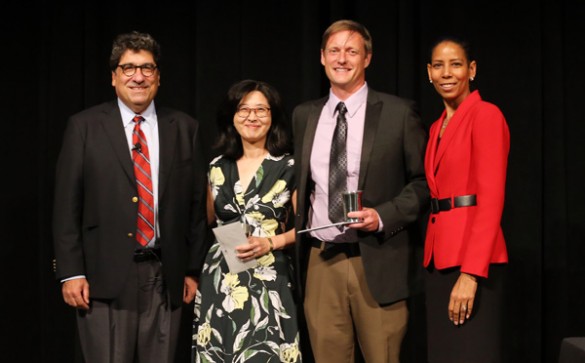
Sohee Park, Gertrude Conaway Professor of Psychology, and Geoffrey Woodman, associate professor of psychology
Park and Woodman were honored for their two papers “Synchronizing theta oscillations with direct-current stimulation strengthens adaptive control in the human brain” and “Medial–Frontal Stimulation Enhances Learning in Schizophrenia by Restoring Prediction Error Signaling.”
Published in Proceedings of the National Academy of Sciences and in Journal of Neuroscience, these papers develop a novel treatment and intervention that can successfully restore high-level mental functions, which when malfunctioning, are believed to be the primary cause of schizophrenia.
“Against the background of scientific knowledge that shows neural activity within the brain arises when a mismatch occurs between what someone expects to happen and what actually occurs, Sohee and Geoffrey demonstrated that using trans-cranial direct-current stimulation, both of these signals can be boosted,” Zeppos said. “The result was an improvement in the ability to detect one’s own errors and learn from misperceptions.”
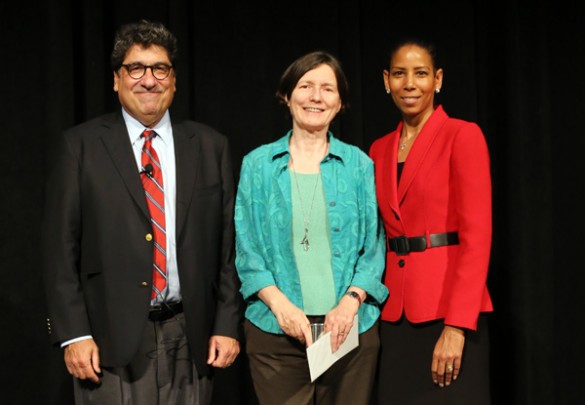
Beth Shinn, professor of human and organization development
Shinn was honored for her co-authored report, Family Options Study: Short-Term Impacts of Housing and Services Interventions for Homeless Families, which stands as the largest experimental study to test different interventions aimed at addressing family homelessness. It was prepared for and published by the U.S. Department of Housing and Urban Development Office of Policy Development Research.
The report is considered so relevant and impactful that the assistant secretary for policy development and research at HUD declared that policymakers would be talking about Shinn’s findings for a decade, and praised the report’s influence on immediate steps that could be taken to improve the future outlook for the homeless population.
“Across national boundaries, Marybeth has urged movement of high-level policymaking,” said the chancellor. “Her utilization of sophisticated social science methodologies to develop new knowledge for this pervasive social problem represents the best of Vanderbilt’s immersive culture and our mission to solve the great challenges facing humanity.”
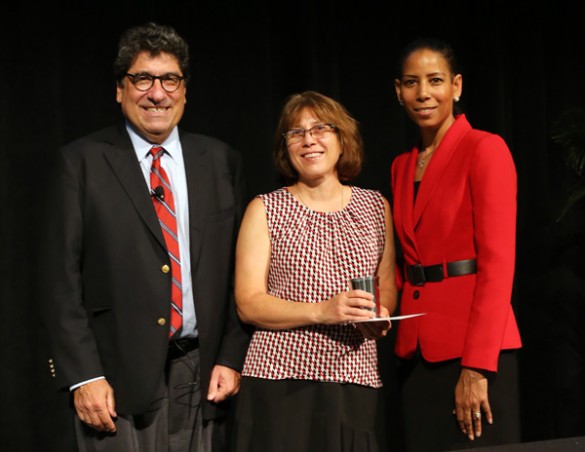
Julia Velkovska, professor of physics and director of graduate studies
Velkovska was recognized for her work on a series of three papers that explore the smallest system in nature capable of exhibiting collective behavior. In her first paper, Velkovska provided a breakthrough in the understanding of the nature of matter on the smallest of scales. Demonstrating that the tiny systems produced by the collisions of heavy ions at the CERN nuclear accelerator display collective behavior, she revealed how despite being only a small fraction of the size of an atomic nucleus, the very smallest systems in nature can feel each other’s presence, interact with one another, and that behavior can only correctly be predicted by including these interactions in calculations.
“Her work received tremendous publicity, ranking as one of the top 10 most highly quoted Vanderbilt research news stories of 2013,” Zeppos said. The other two papers represent experimental confirmation and interesting follow-up work.
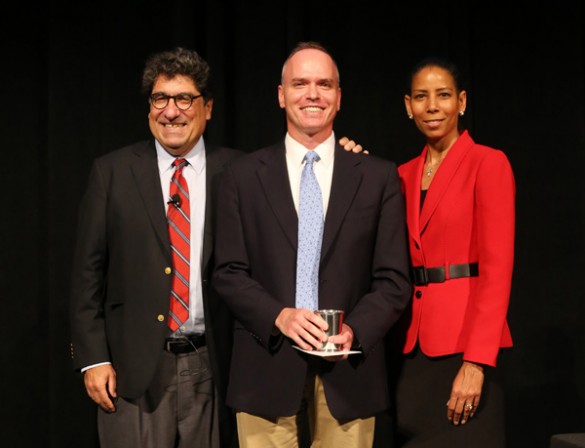
Alan Wiseman, professor of political science and professor of law
Wiseman was recognized for his benchmarking research and his recently published book, Legislative Effectiveness in the United States Congress. The landmark book has garnered two prestigious awards: the Richard F. Fenno, Jr. Prize for best book in legislative studies and the Gladys M. Kammerer Award for the best book on U.S. national policy.
“His research has changed the debate about Congress from re-election and political polarization to what is required for the legislature to be effective,” Zeppos said. “His work reveals why some legislators are more successful than others at pushing bills through Congress.”
Wiseman’s research has been included in the American Journal of Political Science and was also the subject of a National Press Club event. Buttressed by a useful website, members of the public can even research the legislative effectiveness of their own congressional members.
Faculty members recognized for 25 years of service
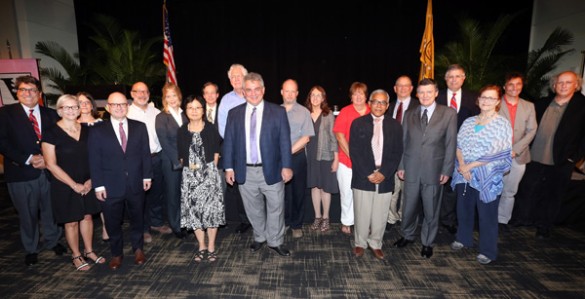
The chancellor also saluted faculty who have reached the 25-year milestone in their tenure at Vanderbilt. “Faculty members who came here a quarter of a century ago have seen Vanderbilt grow and change at an incredible rate. Their contributions during this time span are significant and transformative,” Zeppos said. “I extend hearty congratulations to all of these extraordinary members of our faculty for their deep commitment to our beloved university, and my gratitude for their teaching, service, and scholarship.”
Honored were:
Blair School of Music
- Karen Krieger
- Craig Nies
College of Arts and Science
- John Ayers
- Beth Ann Conklin
- William Franke
- Teresa Goddu
- William Luis
- M.L. Sandoz
- Paul Sheldon
- Helmut Smith
- Leslie Smith
- David Weintraub
Law School
- Nancy King
Owen Graduate School of Management
- Bruce Barry
Peabody College of education and human development
- Ellen Goldring
- Claire Smrekar
- Bahr Weiss
School of Medicine
- Paul Bock
- Richard Breyer
- Thomas Catron
- Thomas Cleveland
- Thomas Davis
- Mark Denison
- Ronald Emeson
- Kathleen Gould
- Jane Howard
- Jeffry McKinzie
- Gregory Mencio
- Douglas Milam
- Paul Moots
- David Raiford
- Lawrence Scheving
- Bih-Hwa Shieh
- Walter Smalley
- Joseph Smith
- William Stead
School of Nursing
- Linda Norman